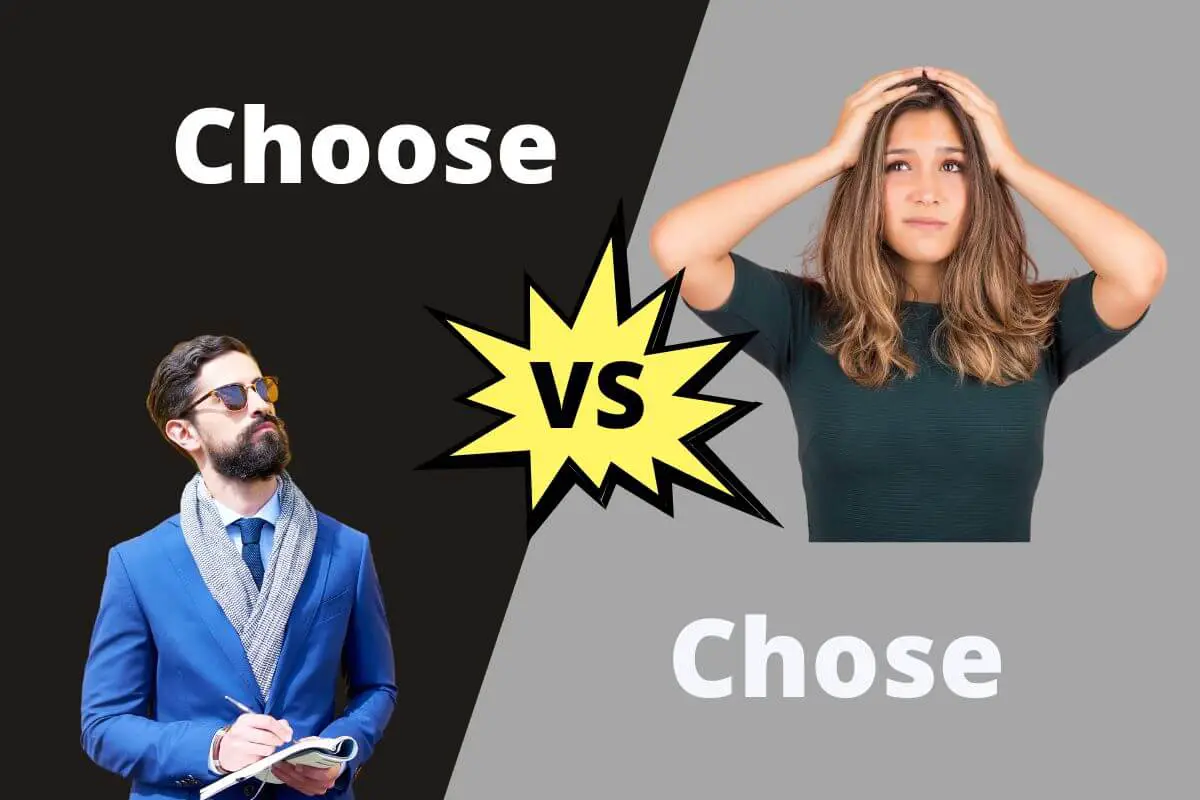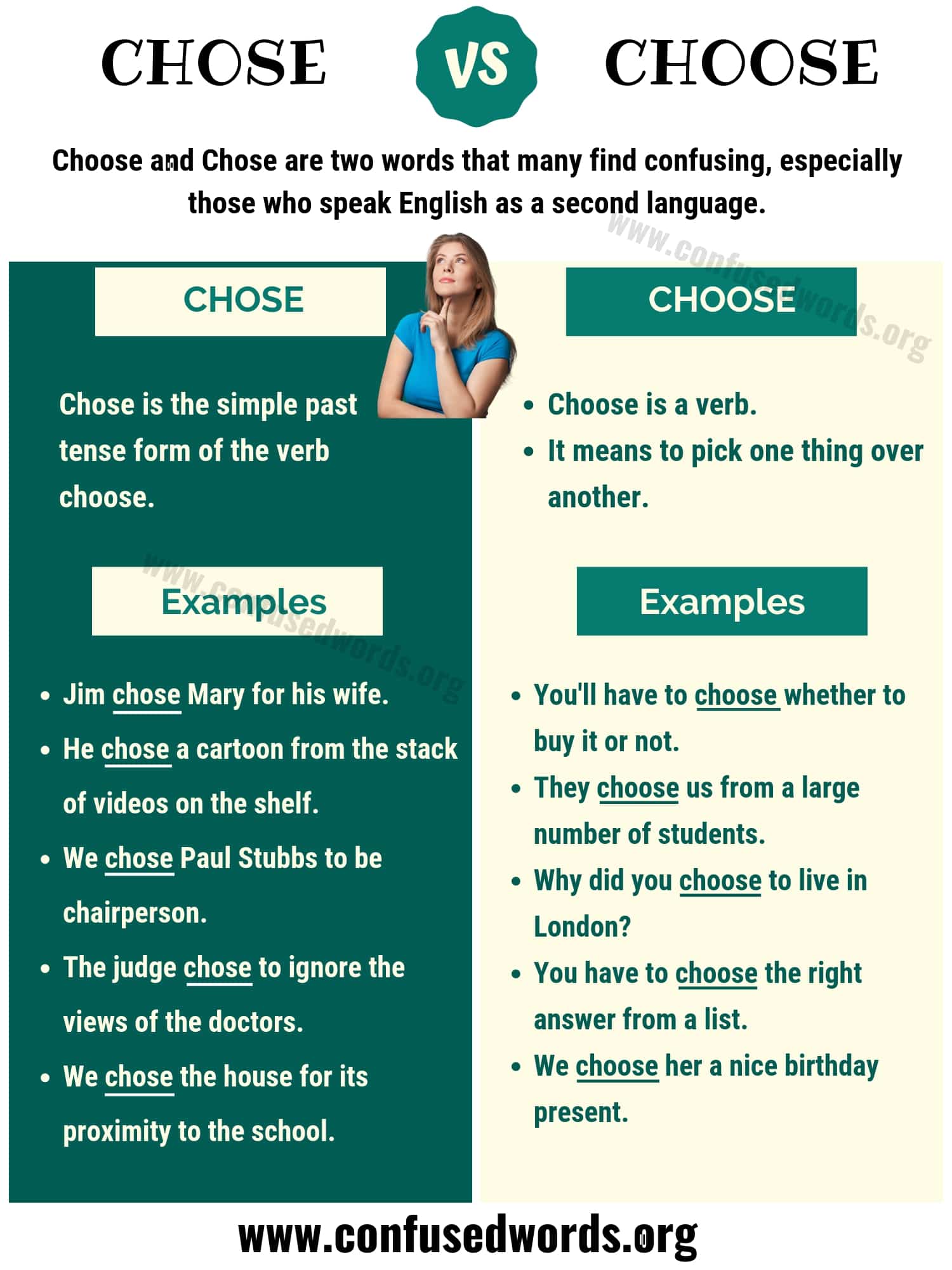Choose Vs. Chose: Mastering Time In Your English Sentences
Navigating the nuances of English grammar can often feel like a delicate dance, especially when encountering words that look similar but carry vastly different meanings or functions. One such pair that frequently trips up even native speakers is "choose versus chose." Understanding the distinction between these two words isn't just about avoiding a grammatical slip-up; it's about precisely conveying when an action of selection occurred, a fundamental aspect of clear and effective communication.
This article will serve as your comprehensive guide to mastering "choose" and "chose," delving into their definitions, proper usage in various contexts, and offering practical tips to ensure you always pick the right word. By the end, you'll not only understand the grammatical rules but also gain the confidence to apply them effortlessly in your writing and speech, enhancing your overall linguistic precision.
Table of Contents
- The Core Difference: Time is Everything
- Why This Distinction Matters: Clarity and Confidence
- Unpacking the Verb "To Choose": An Irregular Journey
- Practical Application: When to Use Which
- Clever Tricks to Remember "Choose" vs. "Chose"
- Common Mistakes and How to Avoid Them
- Beyond Spelling: Pronunciation and Fluency
- Final Thoughts: Embracing Grammatical Precision
The Core Difference: Time is Everything
At the heart of distinguishing between "choose" and "chose" lies the fundamental concept of time, or more specifically, verb tense. These two spellings represent different tenses of the same irregular verb, "to choose." Understanding when the action of selecting occurs is the key to using them both correctly. It's not just a matter of one letter; it's about indicating whether a decision is happening now, will happen, or has already happened.
Choose: The Present and Future Selector
The verb "choose" is primarily used in the present and future tenses. It means to select from a range of possibilities, to decide on a course of action after considering options, or to prefer one thing over another. It implies making a decision when faced with two or more possibilities, right now or at some point in the future. Think of "choose" as the active, ongoing, or impending act of selection.
When you are talking about a decision that is currently being made or will be made in the future, "choose" is your word. For instance, if you are selecting an outfit for today, you would say, "I will choose a blue shirt." If you are discussing a general preference, you might say, "I always choose to take the scenic route." The simple present tense form "chooses" is used after certain third-person subjects, such as "she" or "the committee." For example, "She always chooses the healthiest option."
Here are some examples illustrating the use of "choose":
- "Every morning, I choose what to wear." (Present tense, habitual action)
- "Which movie do you want to choose tonight?" (Present tense, intention for future)
- "The team will choose a new captain next week." (Future tense)
- "You can choose to be happy, regardless of your circumstances." (Present tense, general truth/option)
- "If you choose now, it will happen soon." (Present tense, conditional)
Chose: The Action Already Taken
On the other hand, "chose" is the simple past tense form of the verb "to choose." It signifies that an action of selection or decision has already occurred and is now complete. When you use "chose," you are referring to a past decision – something that was picked or selected from two or more options, or a course of action that was decided upon after consideration, at a previous point in time. It means "to have selected" or "to have decided."
If you are recounting past events or telling stories, "chose" is the appropriate word. For instance, if you're talking about what you wore yesterday, you'd say, "I chose a blue shirt." The meaning of "chose" is to select freely and after consideration, but crucially, this selection has already taken place. Synonyms for "chose" include "opted (for)," "decided (on)," "picked," or "selected."
Here are some examples of "chose" in sentences:
- "Yesterday, I chose a comfortable pair of shoes." (Past tense, completed action)
- "They chose to stay home instead of going out." (Past tense, past decision)
- "The committee chose to implement the new policy after much deliberation." (Past tense, completed decision)
- "In 1955, Rosa Parks chose to remain seated on the bus, sparking a movement." (Past tense, historical event)
- "The hero chose to confront the villain directly." (Past tense, narrative action)
Why This Distinction Matters: Clarity and Confidence
Using the correct form of "choose" versus "chose" is paramount for several reasons, all contributing to the overall quality and effectiveness of your communication. Firstly, it ensures clarity. Misusing these words can lead to confusion about when an action occurred. Imagine saying, "I chose to go to the store tomorrow." This is grammatically incorrect and creates ambiguity: did you already make the decision for tomorrow, or are you making it now for tomorrow? The correct phrasing, "I will choose to go to the store tomorrow" or "I have chosen to go to the store tomorrow," eliminates this confusion immediately.
Secondly, it significantly boosts your writing clarity and confidence. When you consistently use the correct verb tense, your writing flows more smoothly, and your message is received exactly as intended. This precision reflects positively on your command of the language, enhancing your credibility as a communicator. In academic, professional, or even casual settings, accurate grammar demonstrates attention to detail and respect for your audience. It helps avoid misunderstandings and ensures that your narrative or argument is logically coherent. Understanding this difference helps avoid confusion and improves your English.
Moreover, mastering such common grammatical pairs like "choose versus chose" builds a stronger foundation for tackling more complex linguistic structures. It's a stepping stone towards becoming a more articulate and effective speaker and writer, allowing you to express nuanced ideas with greater ease and accuracy. This attention to detail is a hallmark of expertise and trustworthiness in any form of communication.
Unpacking the Verb "To Choose": An Irregular Journey
The verb "to choose" is categorized as an irregular verb in English. Unlike regular verbs that form their past tense and past participle by adding "-ed" (e.g., "walk" becomes "walked"), irregular verbs follow unique patterns. This is why we have "chose" instead of "choosed" for the past tense, and "chosen" for the past participle. Recognizing this irregularity is crucial for proper usage across all tenses.
The Forms: Choose, Chose, Chosen
Let's break down the three principal forms of this verb:
- Base Form / Simple Present: Choose
- Used for present actions, habitual actions, future actions (with "will" or "going to"), and commands.
- Example: "I choose to be happy." "You must choose wisely."
- Simple Past Tense: Chose
- Used for actions completed at a specific point in the past.
- Example: "She chose the red dress yesterday."
- Past Participle: Chosen
- Used with auxiliary verbs like "have," "has," or "had" to form perfect tenses (present perfect, past perfect, future perfect).
- Also used to form passive voice.
- Example (Present Perfect): "I have chosen my career path."
- Example (Past Perfect): "By the time I arrived, they had already chosen a leader."
- Example (Passive Voice): "The winner was chosen by popular vote."
Understanding these three forms is essential for constructing grammatically correct sentences across various tenses and contexts. While this article primarily focuses on "choose versus chose," acknowledging "chosen" completes the picture of this irregular verb's behavior.
Practical Application: When to Use Which
The most effective way to solidify your understanding of "choose" versus "chose" is through practical application and consistent practice. Remember, it all boils down to the timing of the decision or selection.
"Choose" in Action: Present and Future Scenarios
Use "choose" when:
- The decision is being made now:
- "I need to choose which university to attend."
- "Please choose a card from the deck."
- The decision will be made in the future:
- "We will choose a date for the wedding next month."
- "You can choose your dessert after the main course."
- It's a general truth, preference, or habitual action:
- "Many people choose to work from home."
- "She always chooses the window seat."
- It's part of an infinitive phrase (to + verb):
- "It's hard to choose between these two options."
- "He wants to choose his own path."
"Chose" in Action: Recounting Past Decisions
Use "chose" when:
- The decision was made at a specific point in the past:
- "Yesterday, I chose the healthier meal option."
- "They chose to move to a new city last year."
- You are narrating a past event:
- "The knight chose courage over fear."
- "After careful consideration, she chose to decline the offer."
- Referring to a completed past action, even if the exact time isn't specified but implied:
- "He chose his words carefully before speaking."
- "We chose the scenic route, and it was beautiful."
By consistently applying these guidelines, you'll naturally gravitate towards the correct form, enhancing the precision and impact of your communication.
Clever Tricks to Remember "Choose" vs. "Chose"
Sometimes, a simple mnemonic device can make all the difference in remembering tricky grammatical rules. Here are a couple of helpful tricks to distinguish between "choose" and "chose":
- The "Double O" for "Soon" Trick:
- An easy way to remember when to use "choose" over "chose" is that the present tense "choose" contains a double 'o' just like "soon." If you "choose" now, it will happen soon. This links the present/future tense with the double 'o'.
- Think: Choose = Soon (present/future).
- Length of the Word and Tense:
- You can also remember that "choose" and "present" are longer words than "chose" and "past."
- "Choose" (longer word) goes with "present" and "future" (longer concepts/words).
- "Chose" (shorter word) goes with "past" (shorter concept/word).
- Visual Table Reminder:
- Imagine a simple table:
Tense Verb Form Key Idea Present / Future Choose Choosing in the present or future Past Chose Referring to a past decision
- Imagine a simple table:
These simple tricks can provide a quick mental check when you're unsure, helping you make the right grammatical choice every time.
Common Mistakes and How to Avoid Them
Despite the clear distinction, mistakes with "choose" versus "chose" are quite common. Here are some of the most frequent errors and practical advice on how to steer clear of them:
- Using "chose" for future actions:
- Incorrect: "Tomorrow, I chose to go to the beach."
- Correct: "Tomorrow, I will choose to go to the beach." (or "I have chosen to go...")
- Why it's wrong: "Chose" indicates a completed past action. You cannot complete an action that hasn't happened yet.
- Using "choose" for past actions without an auxiliary verb:
- Incorrect: "Last year, she choose a new car."
- Correct: "Last year, she chose a new car."
- Why it's wrong: For simple past actions, you need the past tense form, which is "chose." "Choose" alone is present tense.
- Confusing "chose" with "chosen":
- Incorrect: "They have chose a new leader."
- Correct: "They have chosen a new leader."
- Why it's wrong: "Chose" is the simple past. "Chosen" is the past participle, which is required after auxiliary verbs like "have," "has," or "had" to form perfect tenses.
To avoid these pitfalls, always pause and consider the timing of the action you're describing. Ask yourself: "Did this selection happen already, is it happening now, or will it happen?" Your answer will guide you to the correct form. Regular practice, perhaps through writing exercises or even just consciously applying the rules in daily conversation, will reinforce your understanding and make correct usage second nature.
Beyond Spelling: Pronunciation and Fluency
While spelling and grammatical usage are crucial, mastering a verb also involves its pronunciation. The difference in pronunciation between "choose" and "chose" is subtle but important for fluent and clear communication. The double 'o' in "choose" typically makes a long 'oo' sound, similar to "moon" or "soon." In contrast, the 'o' in "chose" makes a long 'o' sound, similar to "rose" or "nose."
Listen carefully to the difference:
- Choose: /tʃuːz/ (rhymes with "booze," "snooze")
- Chose: /tʃoʊz/ (rhymes with "doze," "goes")
Incorporating audio examples into your study regimen can be incredibly beneficial. Podcasts, language courses, and YouTube tutorials all contain useful resources to aid in mastering the pronunciation of essential verbs such as "choose" and "chose." By actively listening and mimicking native speakers, you'll be better equipped to accurately use and distinguish between "choose" and "chose" in any spoken context, further enhancing your fluency and confidence. Many reputable online dictionaries, such as the Oxford Advanced American Dictionary, also provide audio pronunciations, definitions, example sentences, and usage notes, which are excellent resources for learners.
Final Thoughts: Embracing Grammatical Precision
Understanding the difference between "choose" and "chose" is fundamentally about recognizing time – when the action of selecting occurs. It's a foundational element of verb tense usage in English, and mastering it significantly improves your overall linguistic precision. "Choose" is the present and future tense, meaning to select or prefer, while "chose" is the past tense, meaning to have selected or decided.
To sum it up, use "choose" when talking about making a decision now or in general terms, and use "chose" for decisions that were made in the past. Remember the simple tricks: the double 'o' in "choose" for "soon" (present/future) and the length of the words ("choose" and "present" are longer than "chose" and "past"). These small distinctions, when consistently applied, build a strong command of the English language, making your communication clearer, more confident, and ultimately, more impactful.
- Quagmire Family Guy
- Twerking Bigass
- %D9%8A%D8%A7%D8%B3%D9%85%D9%8A%D9%86 %D8%B2%D8%A8%D8%A7%D8%B1%D9%8A
- Chinga Tu Maga
- Ice In Spanish

Choose Vs Chose | ContrastHub

"Choose" vs. "Chose" – What's The Difference? | Dictionary.com

CHOSE vs CHOOSE: How to Use Choose vs Chose Correctly? - Confused Words